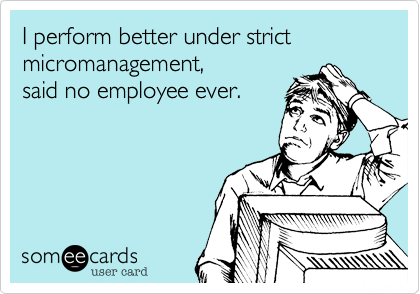
One of the big leaps when you are growing a small business is the move from doing everything yourself to hiring people to do some of the work for you. It might be work that you really don’t like doing (like bookkeeping or filing). It might be work that you don’t know how to do or don’t do very well (like website design or managing your social media). It’s always about hiring people to do the things that you aren’t passionate about, but are necessary to run a successful business.
But hiring people to do this work can be hard. This work that you do is your pride and joy. It’s something you’re deeply passionate about. It’s an extension of who you are. Giving a part of that to someone else to do can feel very uncomfortable. And when you’re uncomfortable, you can inadvertently sabotage your efforts to grow your business.
One of the ways that you can inadvertently sabotage your efforts is to micromanage the person you’ve hired. Micromanaging is a surefire way to sabotage your small business.
Micromanaging causes 2 main challenges
- For you, it means you’re spending as much time (if not more so) managing every tiny detail as of a task as you would have spent just doing it yourself. This means you haven’t actually freed up any of your valuable time to be doing what you love.
- For the person you’ve hired, it means that they are basically being told that you don’t trust them to get a job done properly. Every. Single Day. That somehow their work ethic, their ability to do a task, or their own unique way of doing something isn’t good enough. This constant undermining can eat at a person’s confidence to do the work on their own, and lead to frustration and conflict.
The Opposite of Micromanaging Doesn’t Work Either
I can already hear it. “But if I don’t keep on top of the task it won’t get done properly. I’ve tried that before and it was a disaster. I just ended up doing it myself.” Right?
On the other side of the spectrum, giving someone free reign to do the task they were hired to do doesn’t work either. Without a solid framework of understanding that defines what needs to be done and how it needs to be done to be in alignment with your business, the task won’t get done properly. And you might very well end up just doing it yourself.
So what’s the solution? It’s a middle ground. A balance between enough of a framework that guides how the work is done and enough freedom to operate so that the person you’ve hired can have the authority, space, and encouragement to do what they were hired to do.
Ready to Give Up Micromanaging? There is a Better Way
When you begin to hire employees (and the same is true for when you are leading a team in an organization), it’s critically important to their success that you consider three things:
- The job description: Be really clear about what it is that a person needs to be doing for you.
- Systems & Processes: Have you already figured out how to best do something for your business? Document these systems and processes so that someone else can easily follow them.
- The Givens. These are the non-negotiable ‘rules’. Givens create structure for the work that needs to be done. And within the structure, what emerges is also the freedom to operate. There are givens for your business, and there are givens that will govern the work you’ve hired someone to do. Be clear about these.
When you have these 3 things in place – a clear description of the work, well documented systems and processes to follow, and clear givens – you can easily train someone to do the work and then step back and allow them to flourish in it.
And if things go wrong, rather than tightening the reigns and micromanaging their work, you have a common framework of understanding through the systems, processes and givens to talk about what went wrong and how it can be done better going forward.










Leave a Reply
You must be logged in to post a comment.